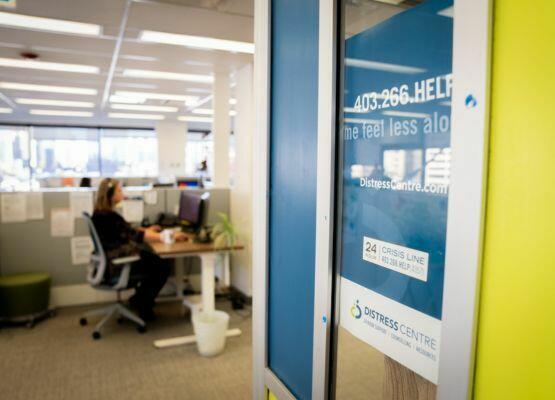Jan. 20, 2025
New UCalgary partnership bridges gaps in crisis care

For more than 50 years, Distress Centre Calgary (DCC) has been a lifeline for individuals in mental health crisis. Now, in a new partnership with the University of Calgary’s Faculty of Social Work, DCC hopes to take its crisis-response services to the next level with the joint creation of the DCC Knowledge Hub (DCC K-Hub).
The purpose of the DCC K-Hub is to drive better outcomes and encourage more overall adaptability for those in crisis. By integrating community feedback and leveraging data-driven insights, the Hub aims to provide person-centred and impactful solutions that are inclusive and culturally relevant.
Through this collaboration, UCalgary brings its expertise in research to ensure the Hub is built on evidence-based practices. This partnership ensures the Hub can generate new knowledge and quickly apply research to improve services and outcomes for those facing crises.
On UCalgary’s side, the work is supported by a committed team of eight research assistants made up of undergraduate, graduate, master's and doctorate students.

The Faculty of Social Work's Calgary campus is housed in the MacKimmie Tower building.
University of Calgary
“The aim was to create something that's innovative and transformative, in a collaborative way,” says Dr. Tara Collins, BSW’02, MSW’03, PhD’22, research project co-ordinator for the DCC K-Hub, adding that this approach allows the Hub to evolve continuously, with the ultimate goal of enhancing crisis intervention and providing global solutions.
Collins’ work supports that of Hub director Dr. Monica Sesma Vazquez, MSW’18, PhD.
Sesma Vazquez agrees the team isn’t just focused on replicating past models; their goal is to ensure the research they do is meaningful, impactful and directly addresses the community’s needs.
“Instead of each organization in Calgary doing their own thing to support crises, they can create a community of care so that callers do not fall through the cracks of this system, and they feel supported in their crisis,” says Sesma Vazquez.
A key focus of the DCC K-Hub is improving services for marginalized populations, including LGBTQ2S+ individuals, newcomers, racialized communities and people from rural areas. These groups often face higher risks for suicidal thoughts and behaviour, but may be less likely to reach out for help.
Sesma Vazquez emphasizes the importance of understanding why these individuals might not engage with traditional crisis services. Addressing these gaps is crucial for providing support where it’s needed most.

Distress Centre Calgary provides many crucial support services to Calgarians, including helplines for those in need.
Distress Centre Calgary
Mike Velthuis Kroeze, director of Programs & Performance at DCC, echoes this concern.
“We can't know everything about everyone, but the more we can learn about the experiences and needs of different groups of people allows to adapt our services to a wider audience,” says Velthuis Kroeze, MSW’24.
The main DCC organization manages a number of other programs and partnerships. Yet, despite these efforts, access to responsive crisis care remains critically urgent. According to Statistics Canada, 12 people die by suicide every day in Canada, with more than 200 attempting suicide daily.
A variety of factors can increase the risk of suicide, including trauma, grief, isolation, financial stress and discrimination. For many, these elements combine in ways that push individuals into crisis.
For some individuals, discussing suicide or mental health can be a significant taboo. As a result, staff at DCC must be trained to ask about mental health struggles in culturally sensitive ways and provide recommendations for support.
“If you're coming from a culture where mental health isn't talked about a lot, saying, ‘Did you talk to your father? Your brother?’ It’s maybe not the right resource for that person, at that time,” says Velthuis Kroeze.
Adaptability and authentic connection are central to the DCC K-Hub’s mission. By ensuring individuals feel heard and supported, the hub offers a lifeline to those in crisis. Velthuis Kroeze reflects on the importance of genuine, voice-based connection, drawing on his own experiences.
As the hub continues to evolve, it remains committed to providing the resources, understanding and care needed for those facing crises. No matter the situation, help is available.
“If anybody’s experiencing any kind of stress, any kind of crisis, they’ll talk to you, they’ll make sure that you’re safe,” says Collins.
The DCC Knowledge Hub is a partnership between the University of Calgary’s Faculty of Social Work and Distress Centre Calgary (DCC) aimed at improving crisis response services.
DCC provides a wide range of crisis intervention and support services to meet the diverse needs of the community, including:
- 24-hour crisis support: Immediate assistance for individuals in distress via phone, text or virtual chat, by contacting 403.266.4357 or visiting the DCC website.
- Crisis counselling: Short-term, professional counselling for those facing urgent mental health challenges, accessed by calling the above number or by filling out an online intake form.
- 2-1-1 Services: A helpline providing information and referrals to community and social services, accessed by calling or texting 2-1-1. A list of specific programs and services is available online.
Curious about creating more accessible and inclusive communities? Join the Hub for a Knowledge Café about strengthening crisis response on Tuesday, Jan. 23. Learn more






